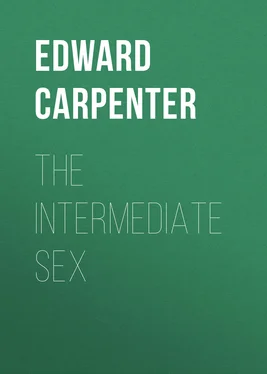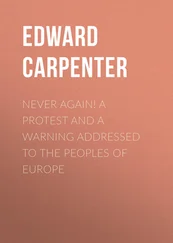Edward Carpenter - The Intermediate Sex
Здесь есть возможность читать онлайн «Edward Carpenter - The Intermediate Sex» — ознакомительный отрывок электронной книги совершенно бесплатно, а после прочтения отрывка купить полную версию. В некоторых случаях можно слушать аудио, скачать через торрент в формате fb2 и присутствует краткое содержание. Жанр: psy_sex_and_family, foreign_edu, foreign_desc, на английском языке. Описание произведения, (предисловие) а так же отзывы посетителей доступны на портале библиотеки ЛибКат.
- Название:The Intermediate Sex
- Автор:
- Жанр:
- Год:неизвестен
- ISBN:нет данных
- Рейтинг книги:4 / 5. Голосов: 1
-
Избранное:Добавить в избранное
- Отзывы:
-
Ваша оценка:
- 80
- 1
- 2
- 3
- 4
- 5
The Intermediate Sex: краткое содержание, описание и аннотация
Предлагаем к чтению аннотацию, описание, краткое содержание или предисловие (зависит от того, что написал сам автор книги «The Intermediate Sex»). Если вы не нашли необходимую информацию о книге — напишите в комментариях, мы постараемся отыскать её.
The Intermediate Sex — читать онлайн ознакомительный отрывок
Ниже представлен текст книги, разбитый по страницам. Система сохранения места последней прочитанной страницы, позволяет с удобством читать онлайн бесплатно книгу «The Intermediate Sex», без необходимости каждый раз заново искать на чём Вы остановились. Поставьте закладку, и сможете в любой момент перейти на страницу, на которой закончили чтение.
Интервал:
Закладка:
Then coming to the literature of the Roman age, whose materialistic spirit could only with difficulty seize the finer inspiration of the homogenic love, and which in such writers as Catullus and Martial could only for the most part give expression to its grosser side, we still find in Vergil, a noble and notable instance. His second Eclogue bears the marks of a genuine passion; and, according to some, 18he there under the name of Alexis immortalises his own love for the youthful Alexander. Nor is it possible to pass over in this connection the great mass of Persian literature, and the poets Sadi, Hafiz, Jami, and many others, whose names and works are for all time, and whose marvellous love-songs (“Bitter and sweet is the parting kiss on the lips of a friend”) are to a large extent, if not mostly, addressed to those of their own sex. 19
Of the mediæval period in Europe we have of course but few literary monuments. Towards its close we come upon the interesting story of Amis and Amile (thirteenth century), unearthed by Mr. W. Pater from the Bibliotheca Elzeviriana. 20Though there is historic evidence of the prevalence of the passion we may say of this period that its ideal was undoubtedly rather the chivalric love than the love of comrades. But with the Renaissance in Italy and the Elizabethan period in England the latter once more comes to evidence in a burst of poetic utterance, 21which culminates perhaps in the magnificent sonnets of Michel Angelo and of Shakespeare; of Michel Angelo whose pure beauty of expression lifts the enthusiasm into the highest region as the direct perception of the divine in mortal form; 22and of Shakespeare—whose passionate words and amorous spirituality of friendship have for long enough been a perplexity to hide-bound commentators. Thence through minor writers (not overlooking Winckelmann 23in Germany) we pass to quite modern times—in which, notwithstanding the fact that the passion has been much misunderstood and misinterpreted, two names stand conspicuously forth—those of Tennyson, whose “In Memoriam” is perhaps his finest work, and of Walt Whitman, the enthusiasm of whose poems on Comradeship is only paralleled by the devotedness of his labors for his wounded brothers in the American Civil War.
It will be noticed that here we have some of the very greatest names in all literature concerned; and that their utterances on this subject equal if they do not surpass, in beauty, intensity and humanity of sentiment, whatever has been written in praise of the other more ordinarily recognised love.
And when again we turn to the records of Art, and compare the way in which man’s sense of Love and Beauty has expressed itself in the portrayal of the male form and the female form respectively we find exactly the same thing. The whole vista of Greek statuary shows the male passion of beauty in high degree. Yet though the statues of men and youths (by men sculptors) preponderate probably considerably, both in actual number and in devotedness of execution, over the statues of female figures, it is, as J. A. Symonds says in his “Life of Michel Angelo,” remarkable that in all the range of the former there are hardly two or three that show a base or licentious expression, such as is not so very uncommon in the female statues. Knowing as we do the strength of the male physical passion in the life of the Greeks, this one fact speaks strongly for the sense of proportion which must have characterised this passion—at any rate in the most productive age of their Art.
In the case of Michel Angelo we have an artist who with brush and chisel portrayed literally thousands of human forms; but with this peculiarity, that while scores and scores of his male figures are obviously suffused and inspired by a romantic sentiment, there is hardly one of his female figures that is so,—the latter being mostly representative of woman in her part as mother, or sufferer, or prophetess or poetess, or in old age, or in any aspect of strength or tenderness, except that which associates itself especially with romantic love. Yet the cleanliness and dignity of Michel Angelo’s male figures are incontestable, and bear striking witness to that nobility of the sentiment in him, which we have already seen illustrated in his sonnets. 24
This brief sketch may suffice to give the reader some idea of the place and position in the world of the particular sentiment which we are discussing; nor can it fail to impress him—if any reference is made to the authorities quoted—with a sense of the dignity and solidity of the sentiment, at any rate as handled by some of the world’s greatest men. At the same time it would be affectation to ignore the fact that side by side with this view of the subject there has been another current of opinion leading people—especially in quite modern times in Europe—to look upon attachments of the kind in question with much suspicion and disfavour. 25And it may be necessary here to say a few words on this latter view.
The origin of it is not far to seek. Those who have no great gift themselves for this kind of friendship—who are not in the inner circle of it, so to speak, and do not understand or appreciate its deep emotional and romantic character, have nevertheless heard of certain corruptions and excesses; for these latter leap to publicity. They have heard of the debaucheries of a Nero or a Tiberius; they have noted the scandals of the Police Courts; they have had some experience perhaps of abuses which may be found in Public Schools or Barracks; and they (not unnaturally) infer that these things, these excesses and sensualities, are the motive of comrade-attachments, and the object for which they exist; nor do they easily recognise any more profound and intimate bond. To such people physical intimacies of any kind (at any rate between males) seem inexcusable. There is no distinction in their minds between the simplest or most naive expression of feeling and the gravest abuse of human rights and decency; there is no distinction between a genuine heart-attachment and a mere carnal curiosity. They see certain evils that occur or have occurred, and they think, perfectly candidly, that any measures are justifiable to prevent such things recurring. But they do not see the interior love-feeling which when it exists does legitimately demand some expression. Such folk, in fact, not having the key in themselves to the real situation hastily assume that the homogenic attachment has no other motive than, or is simply a veil and a cover for, sensuality—and suspect or condemn it accordingly.
Thus arises the curious discrepancy of people’s views on this important subject—a discrepancy depending on the side from which they approach it.
On the one hand we have anathemas and execrations, on the other we have the lofty enthusiasm of a man like Plato—one of the leaders of the world’s thought for all time—who puts, for example, into the mouth of Phædrus (in the “Symposium”) such a passage as this 26: “I know not any greater blessing to a young man beginning life than a virtuous lover, or to the lover than a beloved youth. For the principle which ought to be the guide of men who would nobly live—that principle, I say, neither kindred, nor honour, nor wealth, nor any other motive is able to implant so well as love. Of what am I speaking? Of the sense of honour and dishonour, without which neither states nor individuals ever do any good or great work.… For what lover would not choose rather to be seen of all mankind than by his beloved, either when abandoning his post or throwing away his arms? He would be ready to die a thousand deaths rather than endure this. Or who would desert his beloved or fail him in the hour of danger? The veriest coward would become an inspired hero, equal to the bravest, at such a time; love would inspire him. That courage which, as Homer says, the god breathes into the soul of heroes, love of his own nature inspires into the lover.” Or again in the “Phædrus” Plato makes Socrates say 27: “In like manner the followers of Apollo and of every other god, walking in the ways of their god, seek a love who is to be like their god, and when they have found him, they themselves imitate their god, and persuade their love to do the same, and bring him into harmony with the form and ways of the god as far as they can; for they have no feelings of envy or jealousy towards their beloved, but they do their utmost to create in him the greatest likeness of themselves and the god whom they honour. Thus fair and blissful to the beloved when he is taken, is the desire of the inspired lover, and the initiation of which I speak into the mysteries of true love, if their purpose is effected.”
Читать дальшеИнтервал:
Закладка:
Похожие книги на «The Intermediate Sex»
Представляем Вашему вниманию похожие книги на «The Intermediate Sex» списком для выбора. Мы отобрали схожую по названию и смыслу литературу в надежде предоставить читателям больше вариантов отыскать новые, интересные, ещё непрочитанные произведения.
Обсуждение, отзывы о книге «The Intermediate Sex» и просто собственные мнения читателей. Оставьте ваши комментарии, напишите, что Вы думаете о произведении, его смысле или главных героях. Укажите что конкретно понравилось, а что нет, и почему Вы так считаете.












